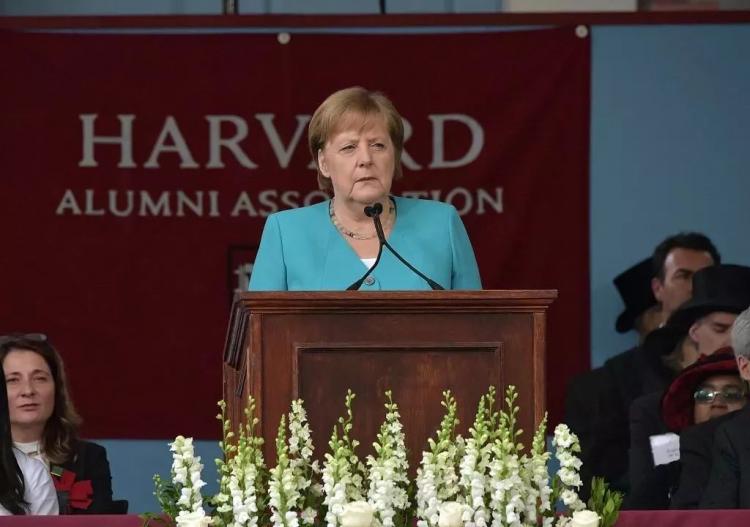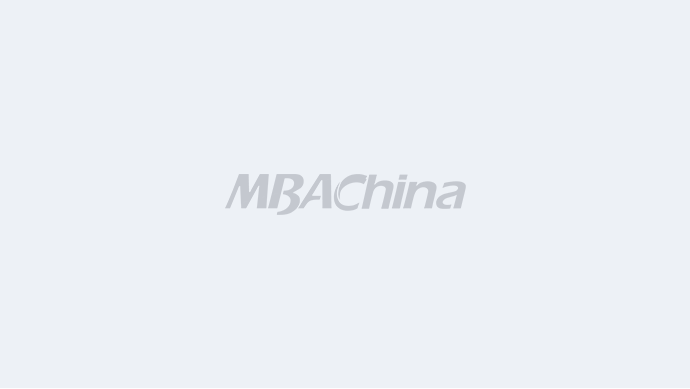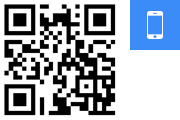德国总理默克尔哈佛演讲全文:写给年轻人的六点建议

【MBAChina网讯】近日,德国总理默克尔获得哈佛大学荣誉法学博士学位,并于该校第368届毕业典礼上发表了演讲,这是哈佛大学时隔29年再度邀请德国总理站在毕业典礼的演讲台上。今天与你分享默克尔总理的演讲全文,希望她的六点建议能够给你带去一些启发——

I am delighted to be here today and would like to tell you about some of my own experiences. This ceremony marks the end of an intensive and probably also hard chapter in your lives. Now the door to a new life is opening. That's exciting and inspiring. The Germany writer, Hermann Hessehas some wonderful words for such a situation in life. I'd like to quote him and then continue in my native language.
Hermann wrote: “In allbeginningdwells a magic force for guarding us and helping us to live.”
These words by Hermann inspired me when I completed my physics degree at the age of 24. That was back in 1978. The world was divided into East and West, and it was in the grips of the Cold War.
I grew up in east Germany in the GDR (German Democratic Republic), the part of my country that was not free at that time, in a dictatorship. People were oppressed and under state surveillance.Political dissidents were persecuted.
The east Germany government was afraid that thepeople would flee to freedom. And that's why it built the Berlin Wall.A wall made of concrete and steel.Anyone caught trying to overcome it was arrested or shot dead.This wall which cut Berlin in half, divided people and divided families. My family was also divided.
My first job after college was as a physicist at the Academy of Sciences in east Berlin. I lived near the Berlin Wall. I walked towards it everyday on my way home from my institute. Behind it, laid west Berlin.Freedom.
And everyday, when I was very close to the wall, I had to turn away at the last minute in order to head towards my apartment. Everyday I had to turn away from freedom at the last minute. I don’t know how often I thought I just couldn’t take it anymore. It was so frustrating. I was not a dissident. I didn't run up and bang against the wall.Nor, however, did I denied its existence for I didn't want to lie to myself.
The Berlin Wall limited my opportunities, it quite, literally, stood in my way. However, there was one thing which this wall couldn't do during all of those years. It couldn't impose limits on my inner thoughts. My personality, my imagination, my dreams and desires, prohibitions or coercion couldn't limit any of that.
Then came 1989, a common desire for freedom unleashed incredible forces throughout Europe. In Portland, in Hungry, at Czechoslovakia,as well as in east Germany, hundreds of thousands of people dared to take to the streets. The People deomonstrated and brought down the Wall. Something which many people, including myself, would not have belive possible become reality. Where there was once only a dark wall, a door suddenly opened. For me, too, the moment had came to walk through that door.
I no longer had to turn away from freedom at the last minute. I was able to cross this borderand venture out into the great wide open.
During these months 30 years ago, I experienced firsthand that nothing has to stay the way it is.This experience, dear graduates, is the first thought I want to share with you today for your future.
Anything that seems to be set in stone or inalterable can, indeed, change. In matters, both large and small, it holds the truth that every change begins in the mind.
My parents' generation discovered this in a most painful way. My father and mother were born in 1926 and 1928. When they were as old as most of you here today, the betrayal of all civilized values that was Shoah and World War II had just ended.
My country Germany had brought unimaginable suffering on Europe and the world.The victors and the defeated could easily have remained irreconcilablefor many years. But instead, Europe overcame centuries-old conflicts. A peaceful order based on common values rather than supposed national strength emerged.
Despite all the discussions and temporary setbacks, I firmly believed that we Europeans have united for the better.And the relationship between Germans and Americans, too, demonstrates how former wartime enemies can become friends.
It wasGeorgeC.Marshall, who gave a crucial contribution to this for the plan he announced at the Commencement ceremonies in 1947, in this very place.
The Trans-Atlantic partnership based on values such, as democracy and human rights, has given us an era of peace and prosperity of benefit to all sides which was lasted for more than 70 years now. And today, it will not be long now before the politicians of my generation are no longer the subject of the exercising leadership program, and at most will be delt with in leadership in history.
Harvard class of 2019, your generation will be faced with the challenges of the 21 century in the coming decades. You are among those will lead us into the future.
Protectionism and trade conflicts jeopardize freeinternational trade, and that's the very foundations of our prosperity.The digital transformation affacts allfacets of our lives.Wars and terrorism lead to displacement and force migration. Climate change poses a threat to our planet’s natural resources.It and the resulting crisis are caused by humans.Therefore, we can and must do everything humanly possible to truly master this challenge to humankind.
It is still possible, however each and everyone of us must play our part. And I say this with a measure of self-criticism, get better.
I will, therefore, to do everything in my power to ensure that Germany, my country, will achieve climate neutrality by 2050.
Changes for the better are possible if we tackle them together. If we want to go it alone, we could not achieve much.
The second thought I want to share with you is, therefore, more than ever, our way of thinking and our actions have to be multilateral rather than unilateral, global rather than national, outward looking rather than isolationist. In short, we have to work together rather than alone.
You dear graduates will have quite different opportunities to do this in future than my generation did. After all, your smart phone probably has considerably more processing power than the copy of an IBM main frame computer manufactured in the Soviet Union, which I was allowed to use for my dissertation in East Germany in 1986.
Today we use artificial intelligence, for example, to search through millions of images for symptoms of diseases in order among other things to better diagnose cancer.
In future, empathetic robots could help doctors and nurses to focus on the individual needs of patients. We cannot predict today which applications will be possible. However, the opportunities it brings are truly breathtaking.
Class of 2019, how we use these opportunities will be largely up to you as graduates.You are the ones who will be involved in deciding how our approach to how we work, communicate, get about indeed our entire way of life will develop.
As Federal Chancellor, I often have to ask myself: am I doing the right thing? Am I doing something because it is right, or simply because it’s possible? That is something you, too, need to keep asking yourself.
And that is the third thought I wish to share with you today.Are we laying down the rules for technology, or is technology dictating how we interact? Do we prioritize people as individuals with a human dignity with all the manifestsor do we see them merely consumers, data sources, objects of surveillance? These are difficult questions.
I have learned that we can find good answers even to difficult questions if we always try to view the world through the eyes of others, if we respect other people's history, traditions, religion and identity, if we hold fast to our inalienable values and act in accordance with them, and if we don't always act on our first impulses, even when there is pressure to make a snap decision. But instead, take a moment to stop, be still, think, pause. Granted that certainly takes courage.
Above all, it calls for truthfulness in our attitudes towards others. And perhaps most importantly, it calls for us to be honest with ourselves.
What better place to begin to do so than here, in this place, where so many young people from all over the world come to learn, research, and discuss the issues of our time under the maxim of truth.
That requires us not to describe lies as truth and truth as lies. It requires us not to accept shortcomings as our normality. Yet, what dear graduates could stop you? What could stop us from doing that?
Once again, the answer is walls. Walls in people's minds, walls of ignorance and narrow-mindedness.
They exist between family members, as well as between groups within the society; between people of different skin colors, nations and religions. I would like us to see break down these walls. Walls that keep preventing us from envisioning of the world in which together we want you to live.
Whether we manage to do that is up to us.That's why my fourth thought, for my dear graduates, to consider is this: nothing can be taken for granted.
Our individual liberties are not given, democracy is not something we can take for granted. Neither is peace, and neither is persperity. But if we break down the walls that hem us in, if we step out into the open and have the courage to embrance new beginnings, everything is possible.
Walls can collapse, dictatorship can disappear. We can hold global warming, we can eradicate starvation, we can eliminate diseases, we can give people ,especially girls, access to education, we can fight the courses of displacement and force migration. We can do all of that.
So let's not stop by asking what isn't possible or focusing on what has always been that way. Let's start by asking what is possible and looking for things that have never been done like that before.
This is exactly what I said to the Bundestag, the German Parliment in 2005, in my first policy statement as newly elected Chancellorof the Federal Republic of Germany and the first woman to hold this office.
And I want to use precisely these words to share with you my fifth thought.
Let us suprise usselves by showing what is possible. Let us suprise ourselves by showing what we are capable of.
In my own life, it was the fall of the Berlin Wall that allowed me almost 30 years ago to step out into the open. A that point, I left my work as the scientist behind me and enter politics. That was an exciting and magical time. Just as your lives will be exciting and magical. But I also experienced moments of doubt and worry. For at that time we all knew what lay behind us, but not what might lie ahead. Perhaps that reflects a little how you, too, are feeling today, admidst all the joy of this occassion.
The sixth thought I also want to share with you is this: the moment when you step out into the open is also a moment a risk taking.
Letting go of the old is part of the new begining. There is no beginning without an end, no day without night, no life without death.
Our whole life consists of the diferences. The space between beginning and ending. It is what lies in between that we call life and experiences.
I believe that time and time again, we need to be prepared to keep bringing in things to an end, in order to feel the magic of new beginning, and to make the most of opportunities.
That's what I learned as a student, as a scientist, and it is what I experience now in politics. And who knows what life will bring after my time as a politician. That, too, is completely open. Only one thing is clear, it will, again, be something different and something new.
That's why I want to leave these wishes with you:
Tear down walls of ignorance and narrow-mindedness, for nothing has to stay as it is.
Take joint action in the interest of the multilateral global world.
Keep asking yourselves:Am I doing something because it is right, or simply because it’s possible?
Don't forget, that freedom is never something that can be taken for granted.
Surprise yourself with what is possible.
Remember that openness always involves risks.Letting go of the old is part of the new begining.
And above all, nothing can be taken for granted. Everything is possible.

以下为演讲中文译文:
谢谢你们!
我想我们开始吧。
尊敬的哈佛校长巴科,联盟成员,监督委员会成员,校友会成员,教职员工,自豪的父母和毕业生们,今天是欢乐的日子,是属于你们的一天,大大祝贺!
今天我很高兴来到这里,并想告诉你们一些我自己的经历。今天也将是你们走向生活挑战的开始。现在,机会的大门正在向你们打开。这多么鼓舞人心。
德国作家赫尔曼·黑塞对这种情况有一些美妙的描述。我想引用他的话,然后继续用我的母语演讲。赫尔曼写道:“所有的开始都拥有神奇的力量,护卫和帮助我们的生活。”
当24岁的我拿到物理学位的时候,这首诗也同样激励过我。那是1979年,当时世界被分成了东方阵营和西方阵营,处于冷战阶段。我在东德长大,一个按计划经济过日子的独裁国家。没有自由,人们没有表达的权利,充满政治迫害。
东德政府害怕人们因追求自由而逃离,于是建造了柏林墙。这是一堵由水泥和钢筋造的墙。任何试图翻越它的人,都被抓起来或者被枪杀。这面墙将柏林分成两半,将人们和家庭分开,其中包括我的家。
我毕业后的第一份工作,是在东德科学研究院做物理科研。我住在离柏林墙很近的地方。每天在我上班和回家的路上,我都要经过它。在它另一侧,是拥有自由的西德。
每天,当我走到接近柏林墙的时候,都不得不在最后一分钟掉头,走回自己的公寓。这意味着,每天,我都不得不在最后一刻,向墙那一边的自由转身。那如此地折磨人,我都不知道多少次觉得再也无法忍受了。
我不是异见者,也没有去冲击过那堵墙。但是,我也从来无法否认那堵墙就在那里。我不想自己欺骗自己。柏林墙限制了我的机会,它就真实地挡在我的前面。
然而,在那些岁月里,这面墙无法做到一点。它不能限制我内心的想法,我的个性,我的想象力,我的梦想和愿望。禁令和强制不能限制任何这些。
1989年,欧洲被自由的浪潮席卷。从波兰,到匈牙利,捷克斯洛伐克,还有东德,成千上万的人勇敢地涌向街头。
人民显示了自己的力量,推翻了柏林墙!
包括我自己在内的许多人,不敢相信的事,成了现实!一扇门,突然被打开了。我也加入人潮,走过那道门。终于,我再也不用在最后一刻,被迫向自由转身。我可以跨过边境线,开始拥抱伟大的开放!
在30年前的那几个月里,我亲身经历到,没有什么是不可能改变的。亲爱的毕业生们,这些是今天,我第一个想跟你们分享的经历。我希望,这能影响到你们对未来的选择。
任何看起来像石头一样一成不变的事务,都是可以改变的!这个道理,无论大事小事,都需要从改变想法开始。
可惜,我父母那一代人,却只能用最痛苦的方式,体会到这个道理。我父母分别出生在1926年和1928年。当他们跟你们年纪差不多的时候,恰好遇到人有背弃美好价值观的倾向,第二次世界大战结束的年代。
我的国家,曾经的法西斯德国,给欧洲和全世界,带来了难以抹去的灾难。战胜和失利的双方,本很可能多年处于无法弥补的对抗中。
然而,实际上,欧洲却快速地摆脱了曾经弥漫了数个世纪的冲突斗争。一种基于共同的价值观,而不是强大的国家主义之上的和平秩序,得以建立。
尽管这一路并不缺乏争议和反复,但是我深信不疑,我们欧洲人因为联合了起来,而变得更好更强大。
而美国和德国之间的友好关系也证明,曾经的战争中的敌人,也可以转变成朋友。乔治·马歇尔是促成这段历史的重要人物。而恰好是在这里,1947年(哈佛)的毕业典礼上,他宣布了这个计划,并为之做出杰出的贡献。
以民主和人权等价值观为基础的跨大西洋伙伴关系,使我们拥有了一个和平与繁荣的时代。到现在已经持续了70多年,所有各方都受益。不久之后,我们这一代的政治家将退出历史舞台。
2019届哈佛毕业生们,你们这一代人将面对21世纪未来几十年的挑战。你们是将我们带到未来的一代人。
保护主义、贸易冲突,危及国际自由贸易,让我们的繁荣基础渐渐流失。数字化信息革命影响着我们生活的方方面面。战争和恐怖主义导致人们流离失所。气候变化对我们星球的自然资源构成威胁。而人类需要对这个危机以及更多的后果负责。
我们能够而且必须尽一切可能,应对这一挑战。现在行动还来得及,但是需要我们每个人都发挥作用。而且我觉得,这个措施也将在批评中走向完善。因此,我将尽力行使我的权利,确保德国在2050年实现"气候中和(即超低碳环保生活)"。
如果我们一起解决它们,会有更好的变化。如果我们只想单独行动,就无法取得多少成绩。
因此,我想与你们分享的第二个想法是,我们比以往任何时候都更需要多边合作,而不是单边行动;需要全球性的,而不是单个国家的;要对外开放,而不是走向孤立主义。简而言之,我们必须共同努力而不是孤军奋战。
亲爱的毕业生们,你们将来会有比我们这一代人更多的机会。毕竟,光你们的智能手机,就可能比苏联制造的IBM主机电脑的副本,具有更多的应用能力。我在1986年的东德,曾经在写论文的时候用到过(这种老古董电脑)。
例如,今天我们使用人工智能,从数百万张图像中搜索到疾病的症状,以便用于更好地诊断癌症(等疾病)。将来,一个充满洞察力的机器人,就可能帮助医生和护士关注患者的个性化需求。
现在,我们还无法预测哪些应用程序将成为可能。但可以肯定的是,它带来的机会将令人叹为观止。
2019级毕业生们,你们将很大程度地决定我们在未来如何利用这些科技。你们将参与决定未来的工作方式,通讯,改变人的整个生活。
作为德国总理,我经常要问自己,我做对了吗?我这么做是因为它是对的,还是仅仅因为方便做成?这也是你需要问自己的问题。
这是我今天想与大家分享的第三个想法。是我们在制定科技规则,还是科技让我们被牵着鼻子走?我们是否充分优先考虑人的尊严,还是只是将大众当成消费者、大数据来源,甚至是观察监控对象?这些都是具有挑战的问题。
我的经验是,如果我们习惯于通过对方的视角看问题,就可以找到很好的答案。这还包括,我们能尊重他人的历史、传统、宗教和身份,坚守自己的价值观并保持一致,在需要尽快决断的压力下也能不冲动行事且保持深思熟虑。当然,这么做肯定需要勇气。
重要的是,我们需要对他人以诚相待。也许最重要的,我们首先要能诚实地面对自己。
还有什么比哈佛更好的地方?在这里,来自世界各地的年轻人,在追求真理的校训下,学习、研究和讨论我们这个时代面临的各种问题。
这要求我们不要把谎言和事实颠倒。它要求我们不能把缺陷看做正常。然而,亲爱的毕业生,有什么可能阻止你们?阻止我们实现这些?
答案是,墙。人们心中的墙,无知的墙壁和狭隘的思想。
它们存在于家庭成员之间,以及社会中不同肤色、民族和宗教的群体之间。墙不断阻止我们对世界协调合作的设想。我们是否能做到这一点,取决于我们自己。
这是我希望在座的各位毕业生思考的第四点,没有什么是理所当然的。
个人自由不是从天而降的,民主制度也并非理所当然地能一直健康存在。同样,人类的和平和繁荣都不是必然的。
但是,如果我们打破桎梏自己的墙壁,如果我们拥抱开放并有勇气步入新的开始,一切皆有可能。
墙可以倒塌,毒菜可以消失。人类可以控制全球变暖,根除饥饿,消除疾病,让人们特别是更多的女孩获得教育的机会,对抗流离失所。这一切我们都可以做到。
所以,让我们不要再问不可能做到什么,或者专注于那种一直以来的方式。让我们首先询问能做什么,并去攻克曾经无法实现那些事。
这恰也是我在2005年,赢得德国大选后,在议会发表第一份政策声明的想法。我是德意志联邦共和国第一位女性总理。
我想用这些话准确地与你们分享我的第五个想法,让我们超越自我,实现各种突破,展示我们的能力和力量。
我的个人经历,是柏林墙的倒塌,让30多年前的我走向了开放和挑战。我离开了科研工作,进入政界。那是鼓舞人心和充满奇迹的年代。正如在座的你们,生活将是令人兴奋和神奇的。
但是,也逃避不了怀疑和担心的时刻。那个时候,我们都知道过去发生了什么,但不知道未来会是怎样。也许这也是今天的你们,在毕业季的欢乐之余,拥有的类似感受。
我想与你分享的第六个想法就是,当你走出去的那一刻,也是冒险开始的时刻。学会继往开来。任何的开始都有结束的时候,白天始终有黑夜相随,生命都逃避不了死亡。
我们的一生会遇到各种不同。开始和结束之间,有着空间。我们称之为生命和经验。我一直相信,我们需要做好准备,习惯结束。因为这是新起点的启航,这样能帮助我们充分把握未来的机会。
这是我无论做学生,做科研,还是从政后,不断体会的道理。谁知道在我离任之后,将会有什么样的生活。但是,一定也会是追求新的挑战的生活。有一件事是很清楚的,将再次是不同的新生活。
这就是为什么我要把这个希望留给你们,推倒无知和狭隘的墙,因为没有什么必须保持原样。
为全球性的多边利益行动。
常常问自己:我之所以去做,是因为这事本身是对的,还是仅仅因为有把握做成它?
不要忘记,自由也需要捍卫。
努力超越自我,给自己带来不断的惊喜。
请记住,开放的同时也带来风险。
告别过去,是新开始的一部分。
最重要的是,没有什么可以被视为理所当然。一切皆可能发生。
(本文转载自长江商学院 ,如有侵权请电话联系13810995524)
* 文章为作者独立观点,不代表MBAChina立场。采编部邮箱:news@mbachina.com,欢迎交流与合作。
备考交流
最新动态
- 整合全球名校资源 长江全球独角兽项目带你打开商业新版图 2024-03-26
- 比亚迪“亮剑”,是双向奔赴还是弯道超车? 2024-03-26
- 新能源汽车的2024:谁能进入决赛圈? 2024-03-18
活动日历
- 01月
- 02月
- 03月
- 04月
- 05月
- 06月
- 07月
- 08月
- 09月
- 10月
- 11月
- 12月
- 04/02 暨南大学MBA名师公开课丨解析AI数字人跳舞视频——制作实操及变现路径
- 04/06 活动报名|投资风险与回报的掌控,港科大MBA大师课助你了解交易的智慧
- 04/06 这所双一流有调剂!云南大学EMBA/MTA调剂政策官方解读来了!
- 04/06 报名 | How your Firm will Shape the Future?“小火车”教授公开课暨复旦大学-BI(挪威)国际合作MBA项目说明会
- 04/08 今晚7点!哈尔滨工业大学商学院调剂说明会直播预约开启
- 04/10 4月10日招生开放日 | 第一批面试前最后一场,交大建筑本科学姐与你分享职业转型经历
- 04/11 【活动报名】4月11日@清华大学|2024科创产业投资峰会:硬科技、智能造、创未来
- 04/11 活动报名 | 中欧思创会洛阳站,聚焦智能制造
- 04/12 活动报名 | 香港中文大学(深圳)金融EMBA校园开放日暨24级课程说明会
- 04/12 长江MBA公开课:AI驱动下的企业变革|活动报名














